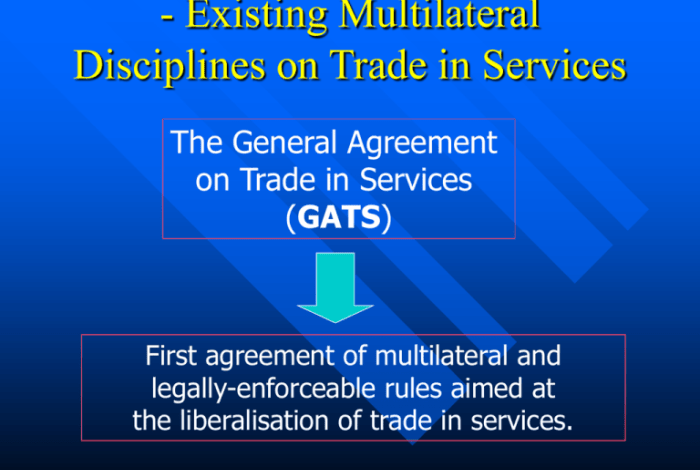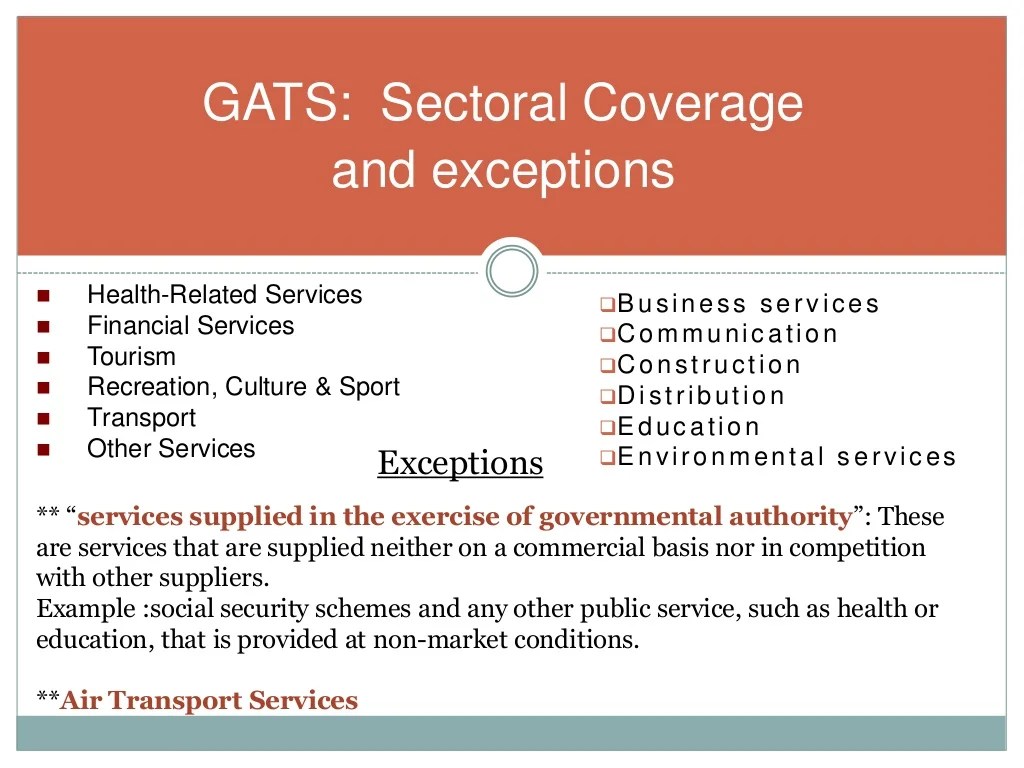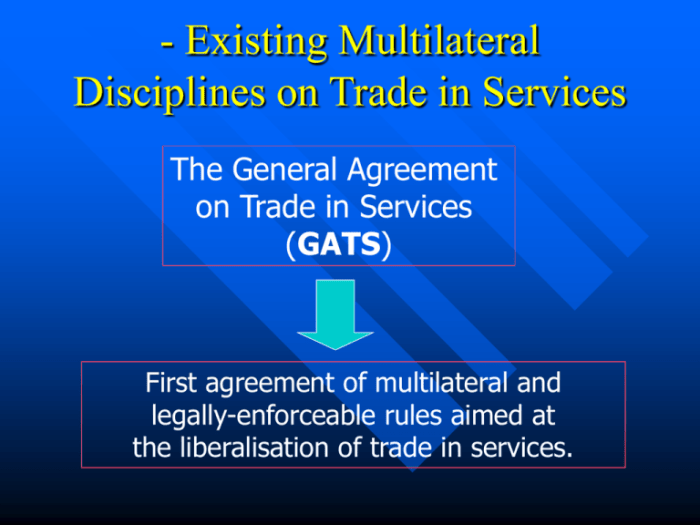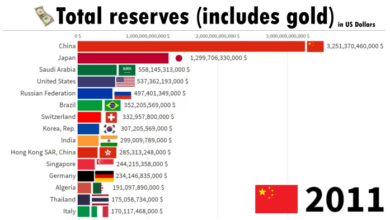
General Agreement on Trade in Services: A Global Framework for Service Trade
The General Agreement on Trade in Services (GATS), a crucial agreement under the World Trade Organization (WTO), sets the stage for global trade in services. Established in 1995, it aims to promote international trade in services by creating a level playing field for businesses and fostering economic growth.
GATS acts as a framework that governs the rules of trade in various service sectors, ranging from banking and insurance to telecommunications and tourism.
GATS operates on the principle of non-discrimination, ensuring that foreign service providers are treated equally to domestic ones. This principle, known as “national treatment,” promotes fair competition and opens doors for greater participation in the global service market. GATS also addresses market access, allowing countries to define their own rules and regulations for foreign service providers while maintaining a commitment to transparency and predictability.
Introduction to the General Agreement on Trade in Services (GATS)
The General Agreement on Trade in Services (GATS) is a multilateral treaty of the World Trade Organization (WTO) that regulates international trade in services. It was established in 1995 as part of the Uruguay Round of trade negotiations.GATS aims to liberalize trade in services by reducing barriers to trade and promoting fair competition among service providers.
The General Agreement on Trade in Services (GATS) aims to liberalize trade in services, but its impact on agricultural markets is complex. One area of concern is the potential for food aid to be used as a form of dumping, harming local producers.
This is discussed in detail in the article food aid as dumping , which highlights the need for careful consideration of the unintended consequences of food aid programs. GATS provisions could be used to address this issue by promoting fair trade practices and ensuring that food aid does not undermine local markets.
It also seeks to ensure that service providers are treated fairly and equitably in foreign markets.
The General Agreement on Trade in Services (GATS) aims to liberalize trade in services, but it’s important to remember that global trade policies often have unintended consequences. One such consequence is the way trade policies can exacerbate existing inequalities, which can, in turn, contribute to the causes of hunger are related to poverty.
Understanding these connections is crucial for crafting effective trade agreements that promote both economic growth and social justice.
Objectives of GATS
The primary objectives of GATS are to:
- Promote the liberalization of trade in services.
- Establish a framework for the regulation of international trade in services.
- Ensure that service providers are treated fairly and equitably in foreign markets.
Principles of GATS
The GATS is based on a number of key principles, including:
- Non-discrimination:This principle requires that countries treat foreign service providers no less favorably than their own domestic service providers.
- Market access:This principle requires countries to allow foreign service providers to enter their markets and compete on a fair basis.
- National treatment:This principle requires countries to treat foreign service providers no less favorably than their own domestic service providers with respect to laws, regulations, and administrative procedures.
- Transparency:This principle requires countries to make their laws, regulations, and administrative procedures relating to trade in services transparent and readily available to the public.
Historical Context of GATS, General agreement on trade in services
The establishment of GATS can be traced back to the 1980s, when there was growing recognition that services were becoming increasingly important to the global economy. The Uruguay Round of trade negotiations, which began in 1986, included a significant focus on trade in services.
The GATS was ultimately signed in 1994 and entered into force in 1995.
Key Provisions of GATS
The GATS contains a number of key provisions, including:
- Market access commitments:These commitments specify the limitations that countries are willing to accept on their right to regulate trade in services. For example, a country might commit to allowing foreign banks to operate within its borders.
- National treatment commitments:These commitments specify the limitations that countries are willing to accept on their right to discriminate against foreign service providers. For example, a country might commit to treating foreign insurance companies the same way as domestic insurance companies.
- General exceptions:These exceptions allow countries to impose restrictions on trade in services for reasons of public policy, such as public health or national security.
Impact of GATS
The GATS has had a significant impact on international trade in services. It has helped to liberalize trade in services, making it easier for service providers to operate in foreign markets. The GATS has also helped to promote fair competition among service providers, ensuring that foreign service providers are treated fairly in foreign markets.
The General Agreement on Trade in Services (GATS) is a complex agreement that aims to liberalize trade in services, but it faces significant challenges in a world grappling with the scale of the debt crisis. The current economic climate, with its soaring inflation and rising interest rates, is making it harder for countries to implement the GATS’s provisions, potentially hindering the growth of the service sector, which is crucial for global economic recovery.
Key Provisions of GATS

The General Agreement on Trade in Services (GATS) is a comprehensive agreement covering trade in services, which has been a significant factor in global economic growth and development. It establishes rules and principles for the liberalization of trade in services, promoting international competition and investment in the sector.
This agreement Artikels a framework for the progressive liberalization of trade in services, encompassing various aspects of market access, national treatment, and other key provisions.
Modes of Supply
The GATS defines four modes of supply, which represent different ways in which a service can be delivered across borders. Understanding these modes is crucial for comprehending the scope of the agreement and its implications for trade in services.
- Mode 1: Cross-border supply: This mode refers to the supply of a service from one country to another without the physical movement of the service provider. Examples include telemedicine, online education, and software development.
- Mode 2: Consumption abroad: This mode involves the consumer of the service traveling to another country to receive the service. Examples include tourism, education, and healthcare.
- Mode 3: Commercial presence: This mode involves the establishment of a commercial presence in another country by a service provider. Examples include setting up a branch office, subsidiary, or joint venture.
- Mode 4: Movement of natural persons: This mode refers to the temporary movement of service providers to another country to provide a service. Examples include engineers, doctors, and teachers.
Sectors Covered by GATS
The GATS covers a wide range of sectors, including:
- Business services: This sector includes accounting, advertising, legal, and management consulting services.
- Communication services: This sector encompasses postal, courier, and telecommunication services.
- Construction services: This sector covers engineering, architectural, and construction services.
- Distribution services: This sector includes wholesale and retail trade, as well as warehousing and transportation services.
- Education services: This sector includes primary, secondary, and tertiary education services.
- Environmental services: This sector covers waste management, water treatment, and pollution control services.
- Financial services: This sector encompasses banking, insurance, and investment services.
- Health services: This sector includes hospitals, clinics, and other healthcare providers.
- Tourism services: This sector covers travel agencies, hotels, and restaurants.
- Transport services: This sector encompasses air, sea, and land transportation services.
Market Access and National Treatment
The GATS promotes liberalization of trade in services through two key principles: market access and national treatment.
- Market Access: This principle requires countries to avoid discriminatory measures that restrict foreign service providers from entering their markets. It sets out specific commitments on market access, including limitations on the number of service providers, types of services, and conditions for entry.
- National Treatment: This principle requires countries to treat foreign service providers no less favorably than their own domestic service providers. This means that foreign service providers should be subject to the same rules, regulations, and procedures as domestic providers.
Exceptions and Limitations to GATS Rules
While the GATS promotes liberalization, it also recognizes that certain exceptions and limitations are necessary to protect public policy objectives.
- Public services: The GATS allows countries to exclude certain services from liberalization if they are considered to be essential public services, such as education, healthcare, and social security.
- Public morals: Countries can restrict services that are considered to be contrary to public morals, such as gambling or prostitution.
- Public security: Services that threaten public security, such as arms manufacturing or nuclear technology, can be excluded from liberalization.
- Health and safety: Countries can impose restrictions on services that pose a threat to public health or safety, such as food safety or environmental protection.
Impact of GATS on Trade in Services

The General Agreement on Trade in Services (GATS) has significantly impacted the global trade in services since its implementation in 1995. It has fostered greater market access and economic growth, but it has also sparked concerns about job displacement and regulatory harmonization.
Positive Impacts of GATS
The GATS has had a positive impact on the global trade in services. It has facilitated increased market access for service providers, leading to greater competition and innovation. This has resulted in lower prices for consumers and businesses, as well as increased efficiency and productivity.
- Increased Market Access:The GATS has opened up markets for service providers, allowing them to operate in new countries and expand their reach. This has led to increased competition and innovation, which has benefited consumers and businesses. For example, the GATS has helped to liberalize the telecommunications sector, allowing foreign companies to provide services in new markets.
This has resulted in lower prices for consumers and increased choice.
- Economic Growth:The GATS has contributed to economic growth by stimulating investment and creating jobs in the service sector. As service providers gain access to new markets, they invest in new infrastructure and technology, which creates new jobs and opportunities for economic growth.
For instance, the GATS has facilitated the growth of the tourism sector, which has created jobs in hospitality, transportation, and other related industries.
Potential Negative Impacts of GATS
While the GATS has had a positive impact on the global trade in services, it has also raised concerns about its potential negative effects. Some argue that the GATS can lead to job displacement as foreign companies compete with domestic service providers.
Additionally, there are concerns that the GATS can undermine national regulatory standards and lead to a race to the bottom in terms of labor and environmental protections.
- Job Displacement:One concern is that the GATS can lead to job displacement as foreign companies compete with domestic service providers. This can be particularly challenging for workers in sectors that are highly sensitive to competition, such as call centers and financial services.
For example, the outsourcing of call center jobs to countries with lower labor costs has been attributed to the liberalization of the telecommunications sector under the GATS. However, it is important to note that the GATS does not require countries to liberalize their service sectors.
Countries can choose to maintain restrictions on foreign investment and competition, if they deem it necessary to protect domestic jobs and industries.
- Regulatory Harmonization:Another concern is that the GATS can undermine national regulatory standards and lead to a race to the bottom in terms of labor and environmental protections. This can happen if countries are pressured to lower their regulatory standards in order to attract foreign investment.
For example, the GATS has been criticized for its potential to weaken labor standards in the financial services sector, as countries may be tempted to reduce labor protections in order to attract foreign investment. However, it is important to note that the GATS does not require countries to harmonize their regulatory standards.
Countries are free to maintain their own standards, as long as they do not discriminate against foreign service providers.
Impact of GATS on Specific Service Sectors
The GATS has had a significant impact on various service sectors, including financial services, telecommunications, and tourism. These sectors have experienced both positive and negative consequences from the implementation of the GATS.
Impact of GATS on Financial Services
The GATS has had a significant impact on the financial services sector, leading to increased competition and innovation. This has resulted in lower prices for consumers and businesses, as well as increased access to financial services. However, it has also raised concerns about job displacement and regulatory harmonization.
- Increased Competition and Innovation:The GATS has opened up the financial services sector to greater competition from foreign companies. This has led to increased innovation and lower prices for consumers and businesses. For example, the GATS has facilitated the growth of online banking and other financial services, which has provided consumers with greater choice and convenience.
However, it is important to note that the GATS does not require countries to liberalize their financial services sectors. Countries can choose to maintain restrictions on foreign investment and competition, if they deem it necessary to protect domestic financial institutions and consumers.
- Job Displacement:One concern is that the GATS can lead to job displacement in the financial services sector, as foreign companies compete with domestic financial institutions. This can be particularly challenging for workers in sectors that are highly sensitive to competition, such as retail banking and investment management.
For example, the outsourcing of back-office functions to countries with lower labor costs has been attributed to the liberalization of the financial services sector under the GATS. However, it is important to note that the GATS does not require countries to liberalize their financial services sectors.
Countries can choose to maintain restrictions on foreign investment and competition, if they deem it necessary to protect domestic jobs and industries.
- Regulatory Harmonization:Another concern is that the GATS can undermine national regulatory standards and lead to a race to the bottom in terms of financial regulation. This can happen if countries are pressured to lower their regulatory standards in order to attract foreign investment.
For example, the GATS has been criticized for its potential to weaken financial regulations, as countries may be tempted to reduce financial regulations in order to attract foreign investment. However, it is important to note that the GATS does not require countries to harmonize their regulatory standards.
Countries are free to maintain their own standards, as long as they do not discriminate against foreign service providers.
Impact of GATS on Telecommunications
The GATS has had a significant impact on the telecommunications sector, leading to increased competition and innovation. This has resulted in lower prices for consumers and businesses, as well as increased access to telecommunications services. However, it has also raised concerns about job displacement and regulatory harmonization.
- Increased Competition and Innovation:The GATS has opened up the telecommunications sector to greater competition from foreign companies. This has led to increased innovation and lower prices for consumers and businesses. For example, the GATS has facilitated the growth of mobile telephony and broadband internet access, which has provided consumers with greater choice and convenience.
However, it is important to note that the GATS does not require countries to liberalize their telecommunications sectors. Countries can choose to maintain restrictions on foreign investment and competition, if they deem it necessary to protect domestic telecommunications companies and consumers.
- Job Displacement:One concern is that the GATS can lead to job displacement in the telecommunications sector, as foreign companies compete with domestic telecommunications companies. This can be particularly challenging for workers in sectors that are highly sensitive to competition, such as call centers and network maintenance.
For example, the outsourcing of call center jobs to countries with lower labor costs has been attributed to the liberalization of the telecommunications sector under the GATS. However, it is important to note that the GATS does not require countries to liberalize their telecommunications sectors.
Countries can choose to maintain restrictions on foreign investment and competition, if they deem it necessary to protect domestic jobs and industries.
- Regulatory Harmonization:Another concern is that the GATS can undermine national regulatory standards and lead to a race to the bottom in terms of telecommunications regulation. This can happen if countries are pressured to lower their regulatory standards in order to attract foreign investment.
For example, the GATS has been criticized for its potential to weaken telecommunications regulations, as countries may be tempted to reduce telecommunications regulations in order to attract foreign investment. However, it is important to note that the GATS does not require countries to harmonize their regulatory standards.
Countries are free to maintain their own standards, as long as they do not discriminate against foreign service providers.
Impact of GATS on Tourism
The GATS has had a significant impact on the tourism sector, leading to increased competition and innovation. This has resulted in lower prices for consumers and businesses, as well as increased access to tourism services. However, it has also raised concerns about job displacement and regulatory harmonization.
- Increased Competition and Innovation:The GATS has opened up the tourism sector to greater competition from foreign companies. This has led to increased innovation and lower prices for consumers and businesses. For example, the GATS has facilitated the growth of online travel agencies and other tourism services, which has provided consumers with greater choice and convenience.
However, it is important to note that the GATS does not require countries to liberalize their tourism sectors. Countries can choose to maintain restrictions on foreign investment and competition, if they deem it necessary to protect domestic tourism companies and consumers.
- Job Displacement:One concern is that the GATS can lead to job displacement in the tourism sector, as foreign companies compete with domestic tourism companies. This can be particularly challenging for workers in sectors that are highly sensitive to competition, such as hotels and restaurants.
For example, the outsourcing of hotel management and reservation services to countries with lower labor costs has been attributed to the liberalization of the tourism sector under the GATS. However, it is important to note that the GATS does not require countries to liberalize their tourism sectors.
Countries can choose to maintain restrictions on foreign investment and competition, if they deem it necessary to protect domestic jobs and industries.
- Regulatory Harmonization:Another concern is that the GATS can undermine national regulatory standards and lead to a race to the bottom in terms of tourism regulation. This can happen if countries are pressured to lower their regulatory standards in order to attract foreign investment.
For example, the GATS has been criticized for its potential to weaken tourism regulations, as countries may be tempted to reduce tourism regulations in order to attract foreign investment. However, it is important to note that the GATS does not require countries to harmonize their regulatory standards.
Countries are free to maintain their own standards, as long as they do not discriminate against foreign service providers.






